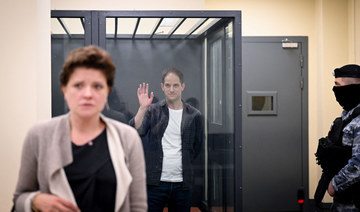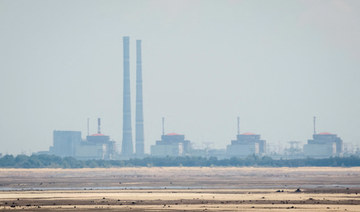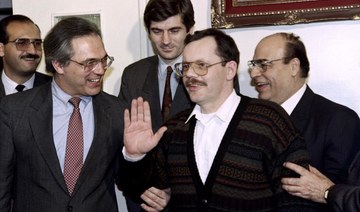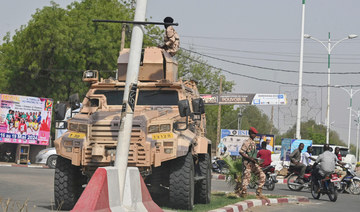Achin, Afghanistan: Afghan farmer Gulnar Malik had seen her share of hardships as war ravaged her country for decades — but nothing prepared the mother of five for the arrival of the Daesh group.
Deash militants seized her village in the east Afghanistan province of Nangarhar, bordering Pakistan, nearly five years ago, unleashing a tide of carnage and slaughter as they sought to expand their self-declared Syria and Iraq “caliphate” into Afghanistan.
The Daesh “fighters committed a lot of atrocities,” Malik, 55, told AFP shortly after the Afghan army dislodged the jihadists from her home district of Achin, following weeks of house-to-house fighting, shelling and US air strikes.
“They shot dead one of my children and injured another. My dead boy was trying to run away when they shot him,” she recalled, adding that her husband had been detained and tortured over a three-week period.
Malik went home last month having spent years in the comparative safety of a nearby town, after Afghan military officials announced that Daesh's Afghan branch, also known as IS in the Khorasan, or IS-K, had been completely defeated in Nangarhar.
While some local officials are not convinced that the loss is comprehensive, the Nangarhar gains — if they hold — would mark a major accomplishment for Afghanistan’s beleaguered security forces.
The exact nature of links between Daesh in Afghanistan and the Middle East remains unclear, but IS-K first emerged in the region in 2014, largely made up of disaffected fighters from the Taliban and other jihadist groups in Afghanistan, Pakistan and Central Asia.
IS-K fighters coalesced in the hilly district of Achin in Nangarhar in 2015, the first time they controlled territory inside Afghanistan.
They confounded early US predictions they would be defeated quickly, withstanding continual air strikes, as well as battles with the rival Taliban.
They replenished their ranks using a mix of cash and extreme ideology spread inside Kabul’s universities.
An AFP correspondent recently traveled with an Afghan army unit to a small village in Achin and saw the destruction wrought by IS-K.
Built on a forested hillside, many stonework buildings had been reduced to rubble, house walls were pockmarked with bullet holes and there were mangled remains of cars on the roadside.
“We were forced to leave our homes. Now we have returned, all our houses and all of our belongings are destroyed,” said local resident Himatullah, 36, who only uses one name.
He recalled that when IS-K fighters first arrived, they forced residents to sit on bombs, then detonated them.
Another day, they beheaded a man accused of infidelity.
Even though the village now is free of IS-K, it will take time for residents to feel safe, and many are traumatized.
“Daesh have planted mines everywhere — in schools, clinics, people’s homes,” Himatullah said, using the Arabic acronym for IS.
According to an American defense official, Afghan military operations supported by US-led coalition air strikes set the conditions that have in recent weeks forced more than 1,400 Daesh fighters and their families to surrender.
Stalled talks between the US and the Taliban were aimed at striking a deal that would have seen the Pentagon pull thousands of troops from Afghanistan in return for various security guarantees, while leaving a counter-terrorism footprint in the country to go after IS-K and other jihadist groups.
In the years since 2015, IS-K proved resilient and resourceful, using tunnels to shelter from an aerial onslaught that famously included the US deploying an immense weapon dubbed the “Mother Of All Bombs” in 2017.
US military officials no longer detail IS-K’s force strength, but for years it was estimated between 2,500 and 4,000 fighters.
“We measure (the) Daesh threat in terms of intentions, capabilities and trajectory, not in numbers,” the defense official told AFP.
The official noted that while IS-K has been defeated in Nangarhar, pockets with the ability to carry out devastating attacks remain, and scattered elements will attempt to regroup.
“Bottom line, Daesh remains a threat — they have the will and intent to export terror outside Afghanistan,” the official added.
Herat Khan, an Achin tribal elder, said only about 10 percent of families stayed in the district during IS-K’s occupation.
The government should “help us in reconstructing schools, houses, clinics and mosques,” Khan said, noting that perhaps thousands of homes had been reduced to rubble.
He said the jihadists remained in two places in Achin, but Afghan army Commander Najibullah said IS-K had been wiped out.
“The whole area has been cleaned of their fighters,” he said.
“They will not make a comeback and the residents of the area, the returnees, should continue their normal lives.”
Still, IS-K remains in Afghanistan, notably in Kunar province, which neighbors Nangarhar, as well as in the capital Kabul.
Stunned residents return after Deash losses in east Afghanistan
Stunned residents return after Deash losses in east Afghanistan
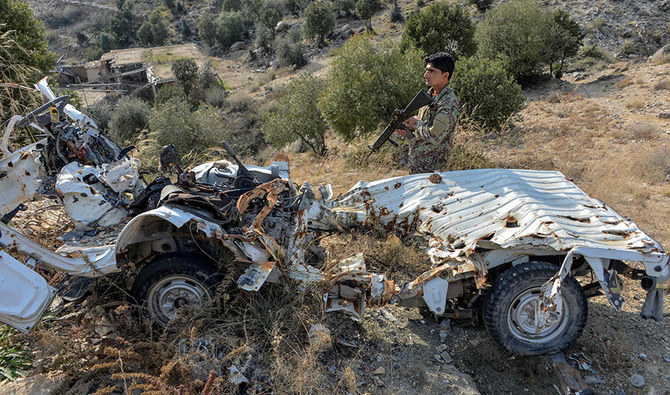
- Afghan military operations supported by US-led coalition air strikes have in recent weeks forced more than 1,400 Daesh fighters and their families to surrender
- IS-K fighters coalesced in the hilly district of Achin in Nangarhar in 2015, the first time they controlled territory inside Afghanistan.
Russia arrests two more top defense officials
MOSCOW: Russia on Thursday arrested a general and a high-ranking defense official on corruption and “abuse of power” charges — the latest senior military figures to be put behind bars this month.
The Kremlin denied it was carrying out a purge of top army officials, but some of Russia’s influential military bloggers welcomed the arrest of a general they hold responsible for battlefield failures in the two-year offensive in Ukraine.
Moscow’s powerful Investigative Committee said Vadim Shamarin, deputy head of Russia’s General Staff, had been placed in detention on suspicion of “large-scale bribe taking.”
The charge carries a maximum prison sentence of 15 years.
The committee alleged that Shamarin had been taking bribes for years from a factory in the Urals city of Perm, saying he had received 36 million rubles (364,000 euros) in kickbacks in return for boosting government contracts.
It said he had been placed in pre-trial detention.
Later on Thursday, the committee announced the arrest of Vladimir Verteletsky — an official from the defense ministry’s department for ensuring state orders.
It said Verteletsky had “been charged with the abuse of his official powers” and has also been placed in detention.
Investigators accuse Verteletsky of taking a bribe in relation to a government contract in 2022, the first year of Moscow’s offensive.
It said the alleged offense had cost the state “over 70 million rubles” (706,000 euros).
Critics and opposition figures have for years said Russia’s military is riddled with corruption, although its leaders have rarely faced any serious probe or retribution.
The issue burst to the forefront amid failures in the Ukraine offensive, with Wagner paramilitary head Yevgeny Prigozhin accusing Russia’s military bosses — then-defense minister Sergei Shoigu and chief of the General Staff Valery Gerasimov — of corruption on an almost daily basis, saying it hobbled Russia’s combat capacity.
Prigozhin died last year in a plane crash just two months after launching a bloody mutiny in a bid to remove the pair.
The arrest of Shamarin, who was head of the General Staff’s communications directorate, is the latest in an apparent crackdown on some of Russia’s top military officials.
But the Kremlin denied it was mounting a purge.
“The fight against corruption is an ongoing effort. It is not a campaign. It is an integral part of the activities of law enforcement agencies,” Kremlin spokesman Dmitry Peskov told reporters on Thursday.
Putin removed Shoigu earlier this month in a surprise reshuffle, replacing him with economist Andrei Belousov.
A deputy defense minister, Timur Ivanov, and head of the ministry’s personnel, Yuri Kuznetsov, also have been arrested in the last few weeks for bribe-taking.
And Ivan Popov, an ex-commander who was sacked after he criticized Russia’s military leaders for a high casualty rate in Ukraine, was arrested earlier this week.
Some Russian military bloggers welcomed the arrest of Shamarin, saying it was communications breakdowns — caused by a lack of equipment due to corruption — that were behind Russia’s military failures in Ukraine.
“Bribery in the military and security services is state treason,” military blogger Anastasia Kashevarova said in a post on Telegram.
Amid the reshuffle and arrests in Moscow, Russian forces in Ukraine have made their most significant advances on the battlefield in 18 months, with a new major assault on the northeastern Kharkiv region.
Four dead, 21 injured in Spain restaurant roof collapse
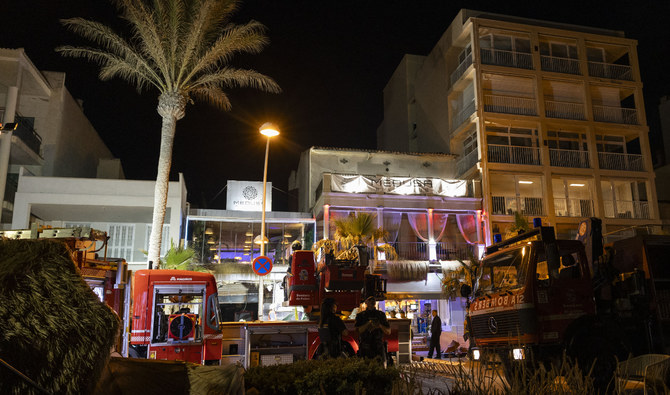
PALMA, Spain: The roof of a restaurant in Spain’s popular tourist island of Mallorca collapsed Thursday, killing four people and injuring more than 20 others, local rescuers said.
“There are four dead and around 21 injured,” the rescuers said, adding that some of the injuries were serious.
Local media said the two-story building was in the Playa de Palma area to the south of the Mediterranean island’s capital Palma de Mallorca.
Firefighters, police officers and ambulances rushed to the scene, according to images published in local media.
Mallorca is one of Spain’s Balearic Islands, whose pristine waters and beaches attract more tourists than all Spanish regions after Catalonia.
More than 14 million tourists visited the islands last year, according to official figures.
Trump says he will quickly free US journalist but Russia denies contacts
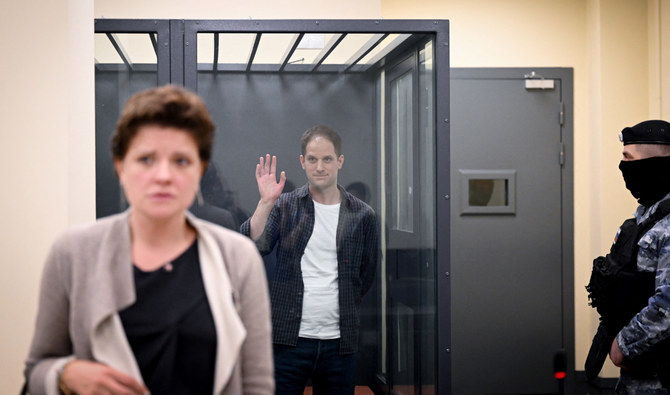
WASHINGTON: Donald Trump boasted Thursday he would quickly free jailed US journalist Evan Gershkovich from Russia if he wins the presidential election, but Moscow denied discussing the case with the Republican candidate.
Trump, who has frequently voiced admiration for Russian President Vladimir Putin and has voiced skepticism over US support for Ukraine, said the Moscow strongman “will do that for me, but not for anyone else.”
“Evan Gershkovich, the Reporter from The Wall Street Journal, who is being held by Russia, will be released almost immediately after the Election, but definitely before I assume Office,” Trump wrote on his Truth Social platform.
“He will be HOME, SAFE, AND WITH HIS FAMILY.”
Trump said that the United States “WILL BE PAYING NOTHING” — a likely jab at President Joe Biden’s deal last year to free Americans from Iran that included the transfer of Iranian oil revenue that had been frozen by South Korea.
Kremlin spokesman Dmitry Peskov, asked about the remarks, said, “There aren’t any contacts with Donald Trump.”
“Regarding (US-Russian) contacts on the matter of incarcerated and convicted individuals, we can say that these contacts must be carried out in total secrecy. This is the only way they can be effective,” he said.
Gershkovich, 32, has been held in Moscow’s notorious Lefortovo prison for more than a year after he was arrested while on a reporting trip to Russia.
He is the first Western journalist since the Soviet era to be arrested by Moscow on spying charges — accusations that he, his employer and the US government reject.
The US ambassador to Russia, Lynne Tracy, visited Gershkovich in prison on Thursday.
He “maintains a positive attitude, awaiting the start of the court process for a case about a crime that he did not commit,” the US embassy said in a statement on platform Telegram.
“We once more urge the immediate release of Evan Gershkovich.”
The Biden administration said in late 2023 that it made a “significant proposal” to Russia to free Gershkovich, likely as part of a prisoner swap, but that Moscow rejected it.
US intelligence concluded that Russia interfered in the 2016 election to help Trump in his upset defeat of Hillary Clinton, including through social media postings.
Trump angrily denied his victory was the work of Russia and, at a famous news conference with Putin, appeared to accept the Russian leader’s denial of interference.
Putin in the latest election cycle has said he prefers Biden, comments met with skepticism by many Russia watchers who believe Putin’s intention may be to use his notoriety to boost Trump.
G7 officials play down expectations on details of loan for Ukraine
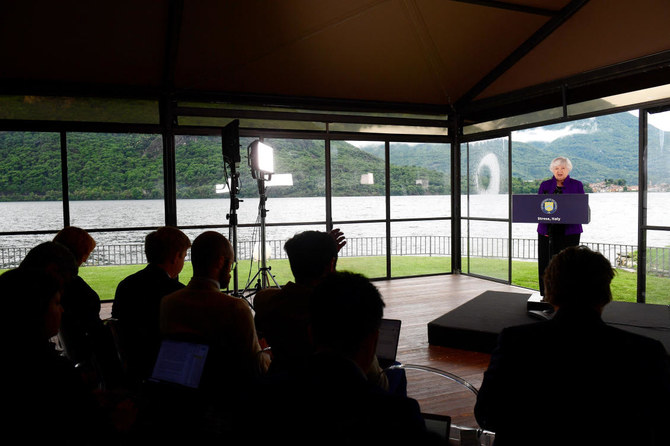
- Using Russian assets for Ukraine not simple, G7 chair says
- Agreement on Ukraine loan seen ‘in principle’
The United States has been pushing its allies to agree to a loan backed by the future income from some $300 billion of Russian assets frozen shortly after Moscow invaded Ukraine in February 2022.
US Treasury Secretary Janet Yellen has said the loan could amount to some $50 billion, but that no amounts have been agreed. Other G7 officials involved in the negotiations voiced caution, citing thorny legal and technical aspects to be hammered out.
“With great difficulty we have found a compromise for the use of the interest (already accrued),” Italian Economy Minister Giancarlo Giorgetti told reporters, referring to a deal already struck by the European Union.
“The problem is how the legal basis for this can be used for future profits.”
Giorgetti, who will chair the meeting as Italy holds the G7 presidency this year, said finding a solution “will not be simple,” and added that several central banks had expressed reservations over the US proposal.
Finance ministers and central bank chiefs from the Group of Seven industrial democracies — the US, Japan, Germany, France, Britain, Italy and Canada — are meeting in the northern Italian lakeside town of Stresa on Friday and Saturday.
One European official said the communique at the end of the meeting would probably include an agreement on a loan in principle, but no details.
“I don’t think there will be any numbers,” the official said when asked about the $50 billion figure.
“There will be no decisions on the matter taken at Stresa,” another European official said.
German Finance Minister Christian Lindner also said many questions remained open and he did not expect the G7 to reach any concrete decision at the Stresa gathering.
In that case, officials will continue to negotiate in the hope of making progress by the time G7 heads of government meet in the southern Italian region of Puglia on June 13-15.
Yellen, at a news conference on Thursday, said she expected a “general agreement on the concept” of using the earnings from Russian assets to provide Ukraine with significant financial support beyond 2025.
A key condition for European Union countries, where most of the assets are held, is to not confiscate the asset principal and harness only the earnings.
Giorgetti said a loan backed by future income from the frozen assets would meet with Russian retaliation, and stressed any deal must have a “solid legal basis,” echoing comments made this week by Japanese Finance Minister Shunichi Suzuki.
Under the proposal being discussed, the loan would be disbursed to Kyiv in one lump sum, Giorgetti said, and could possibly be issued by the G7 countries directly rather than through a global financial institution such as the World Bank.
Ex-junta chief sworn in as Chad’s elected president
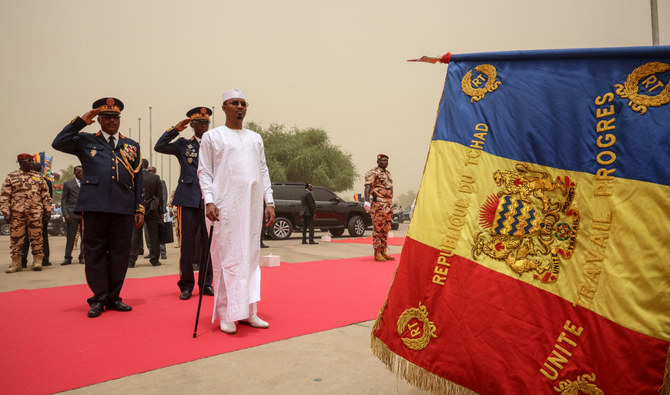
N’DJAMENA: General Mahamat Idriss Deby Itno, who has led Chad’s military junta for three years, was sworn in as president on Thursday after an election victory contested by the opposition.
Deby officially won 61 percent of the May 6 vote that international NGOs said was neither credible nor free and which his main rival called a “masquerade.”
Taking the oath of office, Deby said he swore “before the Chadian people... to fulfil the high functions that the nation has entrusted in us.”
Eight African heads of state as well as Constitutional Council members and hundreds of guests watched as the 40-year-old, dressed in his customary white boubou, was inaugurated as president at the Palace of Arts and Culture in the capital N’Djamena.
The presidential term runs for five years and can be renewed once.
In a speech he had earlier declared a “return to constitutional order” and pledged to be “the president of Chadians from all backgrounds and of all sensibilities.”
Deby was proclaimed transitional president in April 2021 by a junta of 15 generals after his father, iron-fisted president Idriss Deby Itno, was shot dead by rebels after 30 years in power.
The swearing-in marks the end of three years of military rule in a country crucial to the fight against jihadism across Africa’s restive Sahel region.
In 2021, Deby was quickly endorsed by an international community led by France, whose forces in recent years have been ousted by military regimes in its other former colonies Mali, Burkina Faso and Niger.
The investiture ceremony also makes official what the opposition has denounced as a Deby dynasty.
Former ambassador to China Allamaye Halina was named prime minister, according to a presidential decree read out on public television later on Thursday.
His predecessor Succes Masra, one of Deby’s fiercest opponents before becoming prime minister, handed in his resignation on Wednesday in the wake of his party’s election defeat after just four months in office.
Masra, an economist who won 18.5 percent of the vote, contested the results and did not attend the inauguration.
He had claimed victory after the first round of voting but faced accusations of being a junta stooge by the opposition, which has been violently repressed in Chad, with its top members barred from the election.
After the Constitutional Council rejected Masra’s bid to annul the result, he said there was “no other national legal recourse” and called on supporters to “remain mobilized” but “peaceful.”
Deby’s own cousin Yaya Dillo Djerou, who had emerged as the leading opposition candidate to the general, was shot and killed at point-blank range during an army assault on February 28, his party said.
The turnout of heads of state at the investiture was an opportunity to gauge international support for the president.
The eight who were present were all from African nations. Other countries were represented by ministers or ambassadors.
French President Emmanuel Macron, who traveled to N’Djamena in 2021 to pay homage to the late Marshal Deby in front of his son and successor, sent his minister for foreign trade and Francophonie, Franck Riester.
Chad, one of the world’s poorest nations, is France’s last military foothold in the Sahel region, with 1,000 soldiers, and Macron was one of few leaders to publicly congratulate Deby on his election.
Several Sahel nations, reeling from jihadist insurgencies, have strengthened ties with Russia after severing them with Paris.
Russian President Vladimir Putin was among the first to congratulate Deby.



